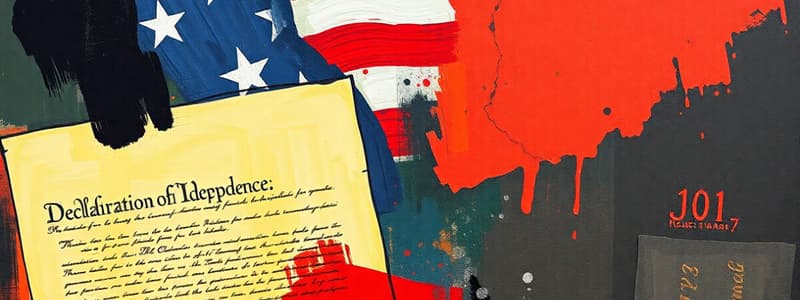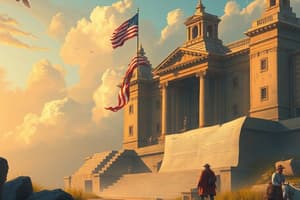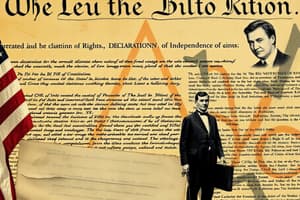Podcast
Questions and Answers
Which of the following accurately describes the significance of the Declaration of Independence?
Which of the following accurately describes the significance of the Declaration of Independence?
- It served as a treaty between the U.S. and foreign nations.
- It announced the U.S. independence from Great Britain. (correct)
- It established the framework for the U.S. Constitution.
- It outlined the rights of European settlers.
Which principle is embodied in the concept of 'rule of law'?
Which principle is embodied in the concept of 'rule of law'?
- Government can make exceptions for individuals in power.
- Lawmakers can alter laws at any time.
- Justice is served by public opinion.
- Everyone, including leaders, must follow the law. (correct)
What are the two parts of the U.S. Congress responsible for making federal laws?
What are the two parts of the U.S. Congress responsible for making federal laws?
- The Supreme Court and the House of Representatives.
- The Executive Council and the Senate.
- The House of Commons and the Senate.
- The Senate and House of Representatives. (correct)
Who holds the primary authority in the executive branch of the U.S. government?
Who holds the primary authority in the executive branch of the U.S. government?
What ensures that no single branch of the U.S. government becomes too powerful?
What ensures that no single branch of the U.S. government becomes too powerful?
Flashcards
What does the Declaration of Independence do?
What does the Declaration of Independence do?
The Declaration of Independence is a document that announced the United States' freedom from Great Britain.
What is freedom of religion?
What is freedom of religion?
Freedom of religion means you can practice any religion or no religion at all. It's a fundamental right.
What is the 'rule of law'?
What is the 'rule of law'?
The 'rule of law' means that everyone, including government officials, must follow the same laws. No one is above the law.
What stops one branch of government from becoming too powerful?
What stops one branch of government from becoming too powerful?
Signup and view all the flashcards
What are the two parts of the U.S. Congress?
What are the two parts of the U.S. Congress?
Signup and view all the flashcards
Study Notes
Declaration of Independence
- Announced independence from Great Britain
- Declared independence from Great Britain
- Stated the United States is free from Great Britain
Rights in the Declaration
- Life
- Liberty
- Pursuit of happiness
Freedom of Religion
- Allows individuals to practice any religion or no religion
Economic System
- Capitalist economy
- Market economy
Rule of Law
- Everyone must follow the law
- Leaders must obey the law
- The government must obey the law
- No one is above the law
Branches of Government
- Congress (legislative)
- President (executive)
- Courts (judicial)
Checks and Balances
- Prevent any one branch of government from becoming too powerful
- Separation of powers
Executive Branch
- Led by the President
Legislative Branch
- Congress makes federal laws
- Includes Senate and House of Representatives
U.S. Congress
- Composed of two parts: Senate and House of Representatives
U.S. Senators
- 100 senators in total
Studying That Suits You
Use AI to generate personalized quizzes and flashcards to suit your learning preferences.




